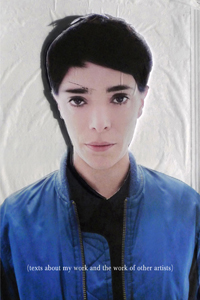An anthology of texts by the artist.
My epidemic (texts about my work and the work of other artists) is the first anthology of writings by French artist Lili Reynaud-Dewar. The oldest text in the book dates back to 2003—but was until now unpublished—whereas the most recent one is still to appear in the forthcoming issue of the art journal
May of the summer 2015. The rest of the compendium has been disseminated during the last twelve years between as many exhibition catalogues and magazines editions in France but mostly abroad. They are sometimes essays on fellow artists (
Lothar Hempel,
François Curlet,
Caroline Mesquita, John Smith, among others), exhibitions reviews, scripts from her artist talks, or can even take the form of a treatise on teaching. The provocative variety of subjects and ideas addressed by Reynaud-Dewar in
My Epidemic stresses the anti-generalizing approach she's now famous for in her sculpture and installation work, her obsession with how much difference differences make.
My epidemic also retraces how her writing style has built up during these twelve years, gaining in visibility and distinctiveness, and it demonstrates the centrality of the role writing has come to play in her artistic practice. This book in this sense reads almost like a biography.
As often the case in her projects, Reynaud Dewar has collaborated with a number of close artist friends and colleagues for this book:
Verena Dengler wrote the foreword;
Marina Faust created the cover; Ramaya Tegegne designed this volume and inserted two new visual essays of her
Bzzz Bzzz Bzzz series within; Paraguay Press published it. It is, after the books
Interpretation and
Pensée Nomade Chose Imprimée, a new chapter in the ongoing collaboration between the artist and the Belleville-based imprint.
Pulling from a multiplicity of influences – fashion subcultures, radical design, or the history of cinema –, Lily Reynaud Dewar (born 1975 in La Rochelle, France) draws slanting lines between her personal history and some universal cultural signifiers. She often identifies with icons of cultural or racial transgression, such as writer and activist
Jean Genet, visionary jazz musician
Sun Ra, or dancer Josephine Baker. Thanks to the use of performance and the text, and through ever-changing roles and the interplay of people and objects, Reynaud Dewar creates a dialogue that challenges fixed identities, or the politics of the exhibition.

